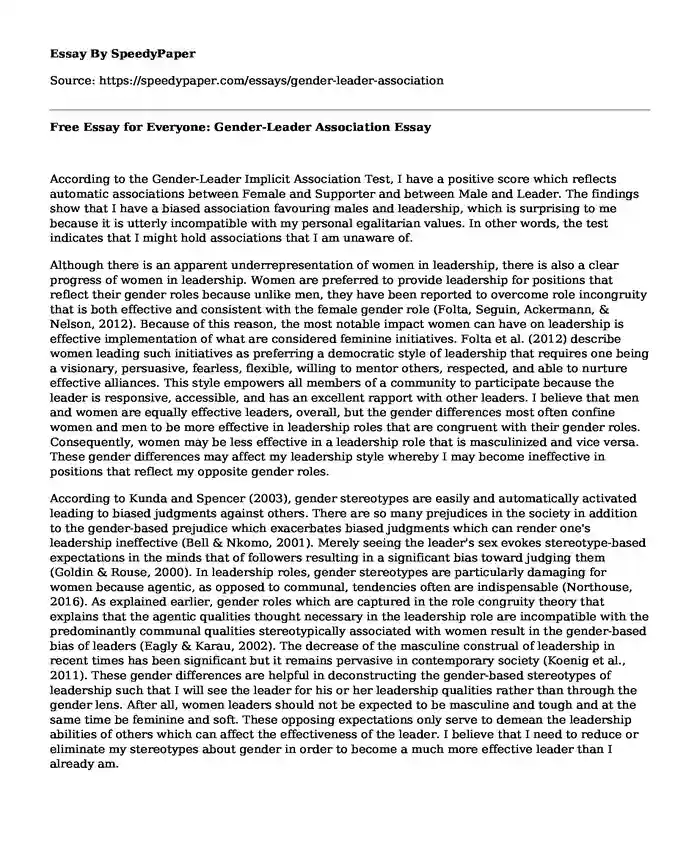
| Type of paper: | Course work |
| Categories: | Leadership analysis Gender |
| Pages: | 3 |
| Wordcount: | 673 words |
According to the Gender-Leader Implicit Association Test, I have a positive score which reflects automatic associations between Female and Supporter and between Male and Leader. The findings show that I have a biased association favouring males and leadership, which is surprising to me because it is utterly incompatible with my personal egalitarian values. In other words, the test indicates that I might hold associations that I am unaware of.
Although there is an apparent underrepresentation of women in leadership, there is also a clear progress of women in leadership. Women are preferred to provide leadership for positions that reflect their gender roles because unlike men, they have been reported to overcome role incongruity that is both effective and consistent with the female gender role (Folta, Seguin, Ackermann, & Nelson, 2012). Because of this reason, the most notable impact women can have on leadership is effective implementation of what are considered feminine initiatives. Folta et al. (2012) describe women leading such initiatives as preferring a democratic style of leadership that requires one being a visionary, persuasive, fearless, flexible, willing to mentor others, respected, and able to nurture effective alliances. This style empowers all members of a community to participate because the leader is responsive, accessible, and has an excellent rapport with other leaders. I believe that men and women are equally effective leaders, overall, but the gender differences most often confine women and men to be more effective in leadership roles that are congruent with their gender roles. Consequently, women may be less effective in a leadership role that is masculinized and vice versa. These gender differences may affect my leadership style whereby I may become ineffective in positions that reflect my opposite gender roles.
According to Kunda and Spencer (2003), gender stereotypes are easily and automatically activated leading to biased judgments against others. There are so many prejudices in the society in addition to the gender-based prejudice which exacerbates biased judgments which can render one's leadership ineffective (Bell & Nkomo, 2001). Merely seeing the leader's sex evokes stereotype-based expectations in the minds that of followers resulting in a significant bias toward judging them (Goldin & Rouse, 2000). In leadership roles, gender stereotypes are particularly damaging for women because agentic, as opposed to communal, tendencies often are indispensable (Northouse, 2016). As explained earlier, gender roles which are captured in the role congruity theory that explains that the agentic qualities thought necessary in the leadership role are incompatible with the predominantly communal qualities stereotypically associated with women result in the gender-based bias of leaders (Eagly & Karau, 2002). The decrease of the masculine construal of leadership in recent times has been significant but it remains pervasive in contemporary society (Koenig et al., 2011). These gender differences are helpful in deconstructing the gender-based stereotypes of leadership such that I will see the leader for his or her leadership qualities rather than through the gender lens. After all, women leaders should not be expected to be masculine and tough and at the same time be feminine and soft. These opposing expectations only serve to demean the leadership abilities of others which can affect the effectiveness of the leader. I believe that I need to reduce or eliminate my stereotypes about gender in order to become a much more effective leader than I already am.
References
Bell, E., & Nkomo, S. (2001). Our separate ways: Black and white women and the struggle for professional identity. Boston: Harvard Business School Press.
Eagly, A. H., & Karau, S. J. (2002). Role congruity theory of prejudice toward female leaders. Psychological Review, 109, 573-598.
Folta, S. C., Seguin, R. A., Ackerman, J., & Nelson, M. E. (2012). A qualitative study of leadership characteristics among women who catalyze positive community change. BMC public health, 12(1), 383.Goldin, C., & Rouse, C. (2000). Orchestrating impartiality: The impact of "blind" auditions on female musicians. American Economic Review, 90, 715-741.
Kunda, Z., & Spencer, S. J. (2003). When do stereotypes come to mind and when do they color judgment? A goal-based theory of stereotype activation and application. Psychological Bulletin, 129, 522-544.
Northouse, P.G. (2016). Leadership: Theory and Practice. 7th Ed. SAGE Publications, Inc.
Cite this page
Free Essay for Everyone: Gender-Leader Association. (2022, Aug 19). Retrieved from https://speedypaper.net/essays/gender-leader-association
Request Removal
If you are the original author of this essay and no longer wish to have it published on the SpeedyPaper website, please click below to request its removal:
- Free Essay on Public Health Campaign on Social Media
- Sadie Pfeiffer, Spinner in Cotton Mill - Free Essay on the Picture by Lewis Hine
- Essay Example on Reputation Management Research
- Free Essay Sample with Camille Dreyfus Biography
- Paper Example on Description of The Chosen Injury Prevention Intervention
- Essay Example. Race for Solar Power in Africa
- Essay Example - The Manhattan Project
Popular categories




